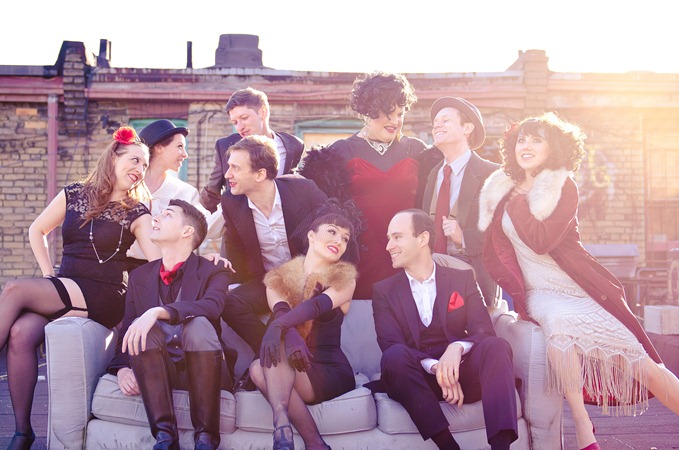
Love is a Poverty You Can Sell 2: Kisses for a Pfennig is a cabaret night in the style of the 1920’s; songs interspersed with comedy acts from the MCs, who also give you a two part story number regarding a corrupt, buffoonish character who becomes burgermeister (mayor) in a remote Bavarian town, a narrative attuned to the municipal politics of Toronto today.
A lot of the songs are from Kurt Weill who is, in my mind, one of the best examples of musicianship with an impact both emotional and political. He may have died in 1950 but his songs remain resonant today, and are adeptly handled by Soup Can Theatre. The costumes are fabulous, the music and song almost always compelling and the staging has that underground feel, where it is well choreographed but never too polished to delude you that these aren’t real, actual people up there.
Not all the songs are from the first half of the last century. One of the most powerful numbers is Don’t Be The Bunny from Urinetown. It allows Soup Can to comment on the Nazi element that is inevitably brought to mind when one sees people using German accents in period costuming. It’s performed by Michael-David Blostein, who has a voice that made my brain vibrate with delight. I had a similar sensation with the vocals of Natasha Negovanlis’s performance of Youkali.
There’s also a bit of gender-bending in the show, particularly with Christian Jeffries singing one of the most well-known songs from Cabaret, Mein Herr, backed by a dancing troupe of fish-netted boys.
Amanda Palmer fans will be excited that there’s also a number to Coin Operated Boy. I love the song, but felt the singer didn’t really get into her stride until about half way through the piece. It was just the first night though: I’ll bet that it gets better.
My other favourites of the night were the Tango Ballad and Boulevard of Broken Dreams (no, that term was not coined by Green Day.)
One thing I didn’t really get were the “bar flys”. These were people who were in costume and character, in the audience and interacting with us before the show and during the break. One of them seemed to be acting particularly drunk and upset, even stomping around during the performance. I expected this to come of something, that she would take over the stage and do some sort of song or performance, but nothing like that happened. With no payoff it just felt like a useless distraction.
Any such distraction was wonderfully counterbalanced by the presence of a live orchestra. I want to name them all, but you’d stop reading. There’s around thirteen of them and they made everything so immediate and vibrant and lovely.
I should also note that while this is an hour and a half show, there is an intermission, and you can also get food and booze. So if you’re packing in the Fringing, this is a way to see a play while also not going hungry.
Details
- Love is a Poverty You Can Sell 2: Kisses for a Pfennig plays at Bite, 423 College Street
- Performances are:
July 03 07:00 PM
July 04 07:00 PM
July 05 07:00 PM
July 06 07:00 PM
July 07 07:00 PM
July 09 07:00 PM
July 10 07:00 PM
July 11 07:00 PM
July 12 07:00 PM
July 13 07:00 PM
July 14 07:00 PM
Tickets
- Individual Fringe tickets are available at the door for $10 ($5 for FringeKids), cash only. Late comers will not be permitted.
- Advance tickets are $11 ($9 + $2 service charge) are available online at fringetoronto.com, by phone at 416-966-1062 ext 1, or in person during the festival at the Festival Box Office in the parking lot behind Honest Ed’s (581 Bloor St W).
- Value packs are available if you plan to see at least 5 shows
Image of Love is a Poverty You Can Sell 2: Kisses for a Pfennig provided by Soup Can Theatre.

One thought on “Love is a Poverty You Can Sell 2: Kisses for a Pfennig (Soup Can Theatre) 2013 Toronto Fringe Review”
Comments are closed.